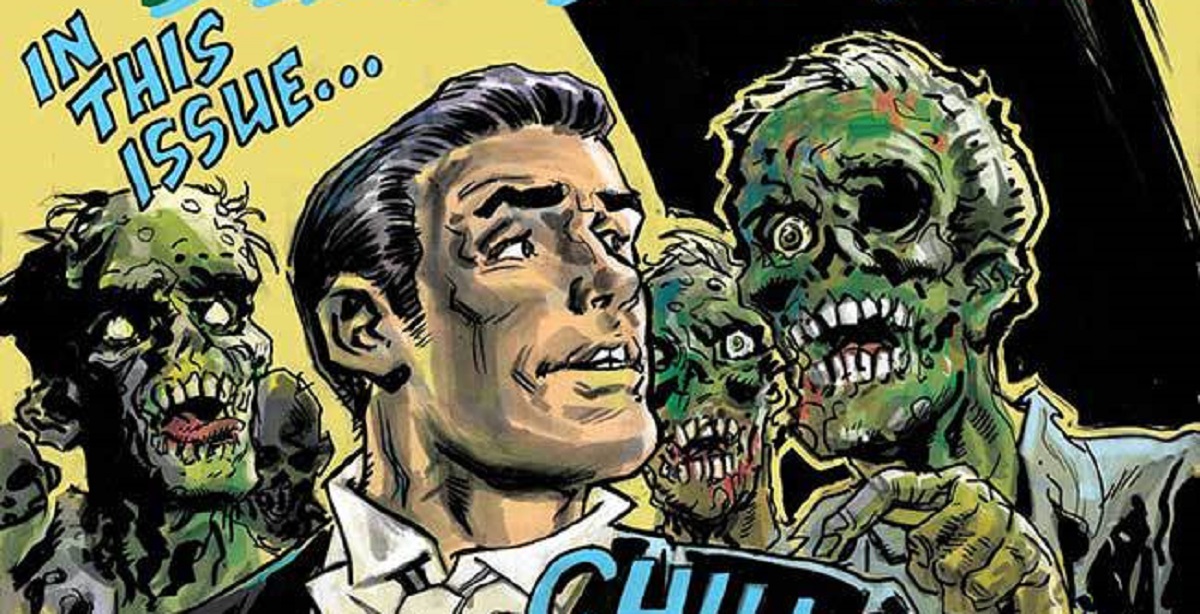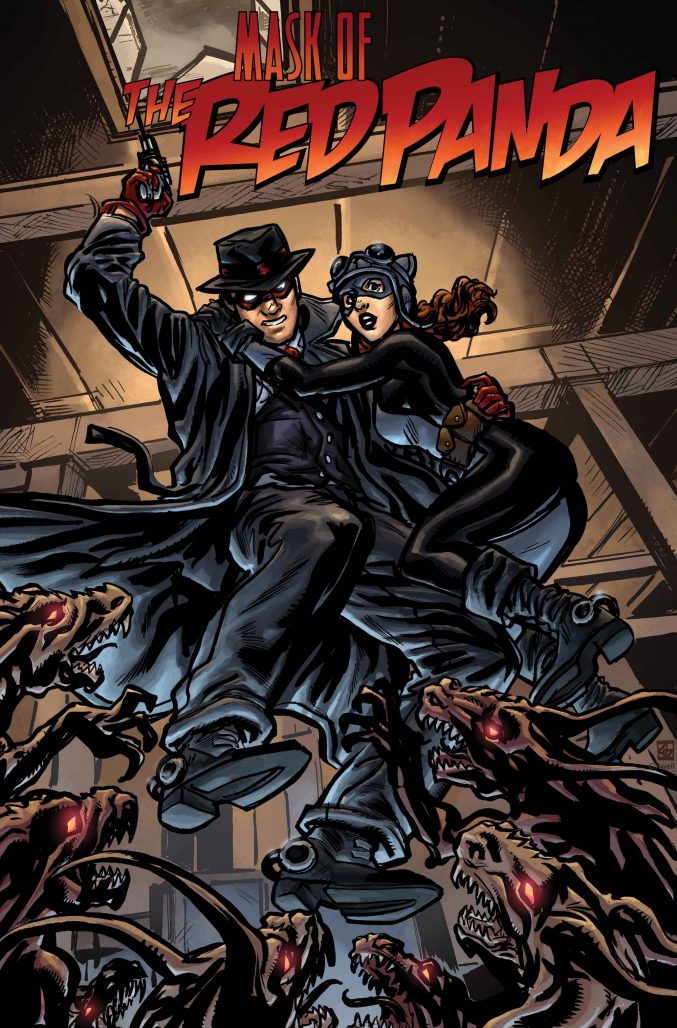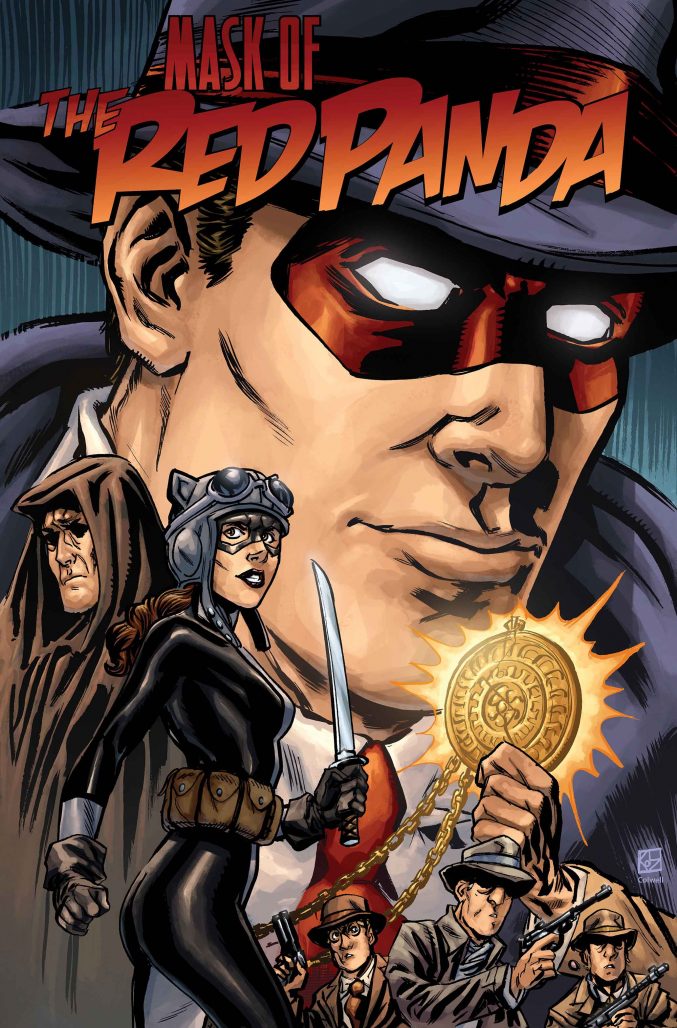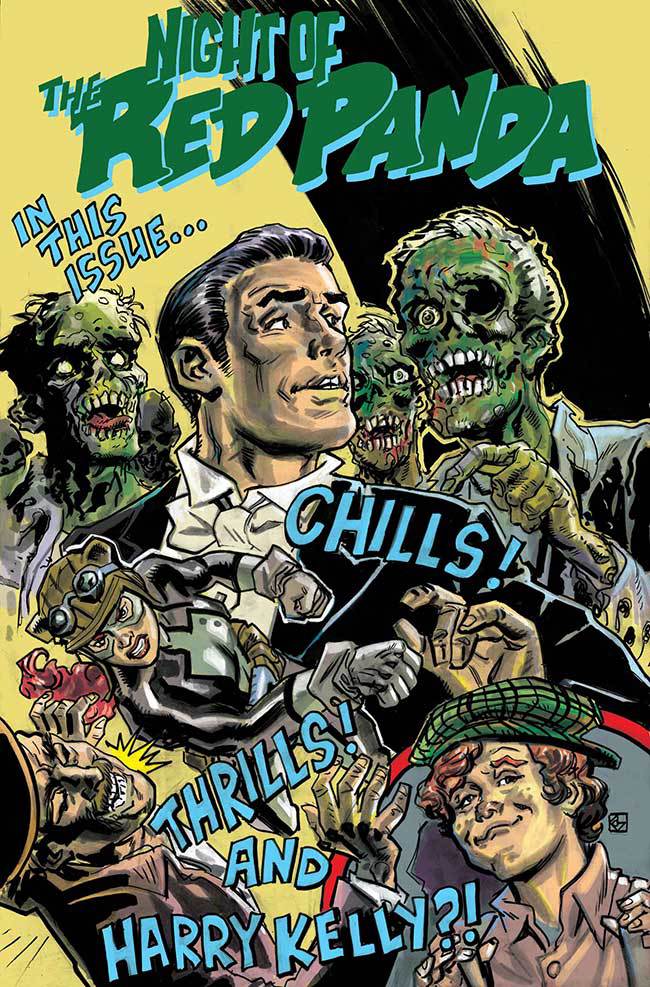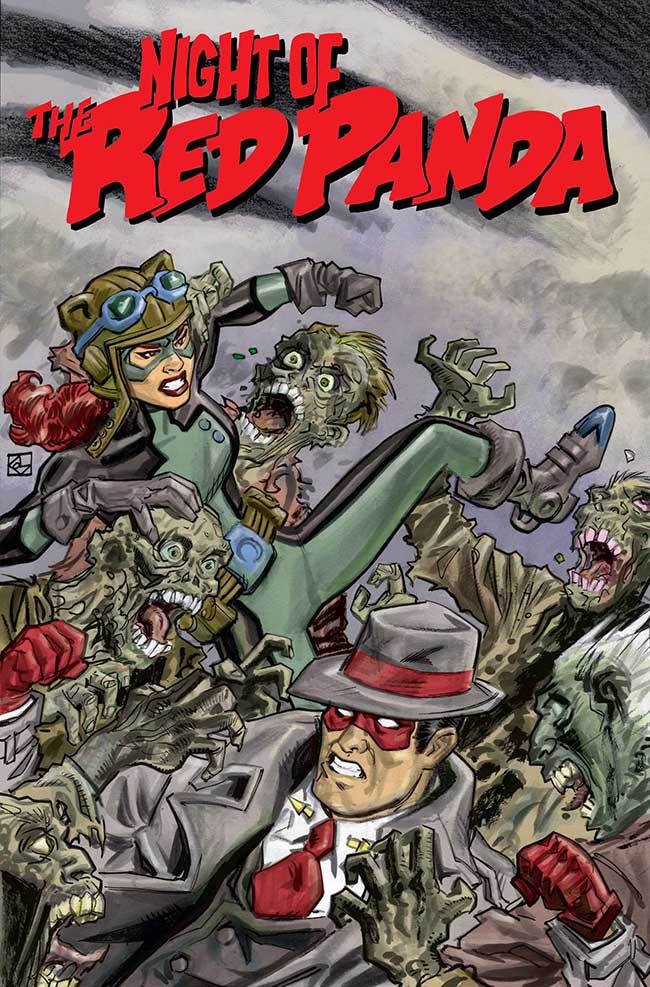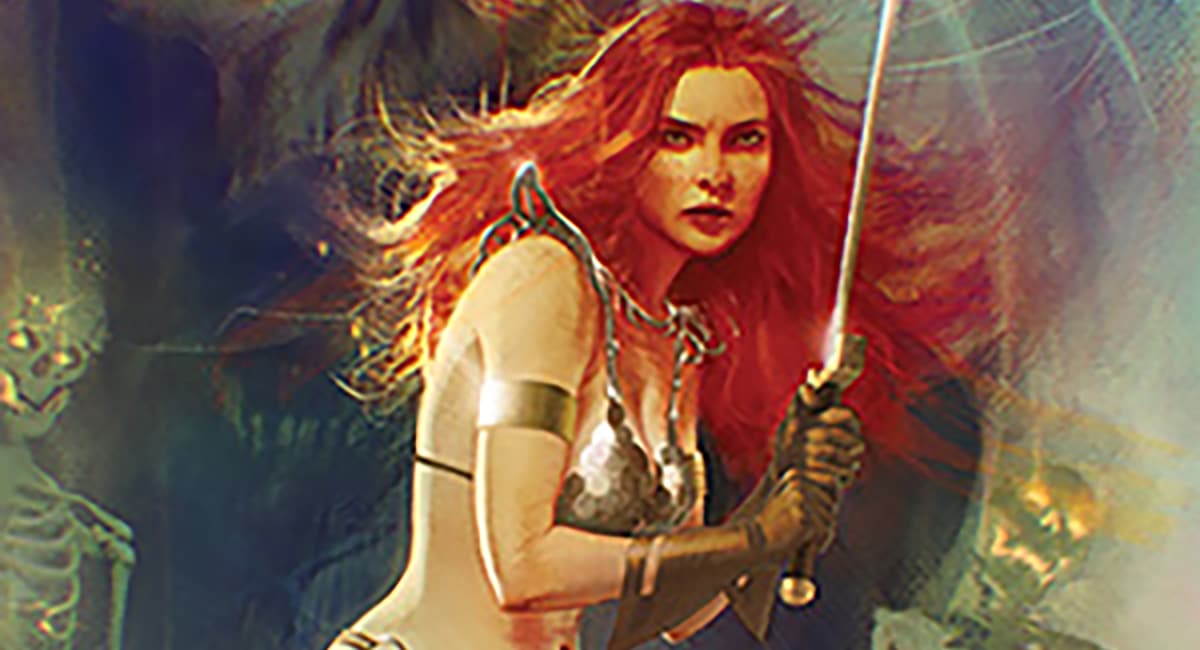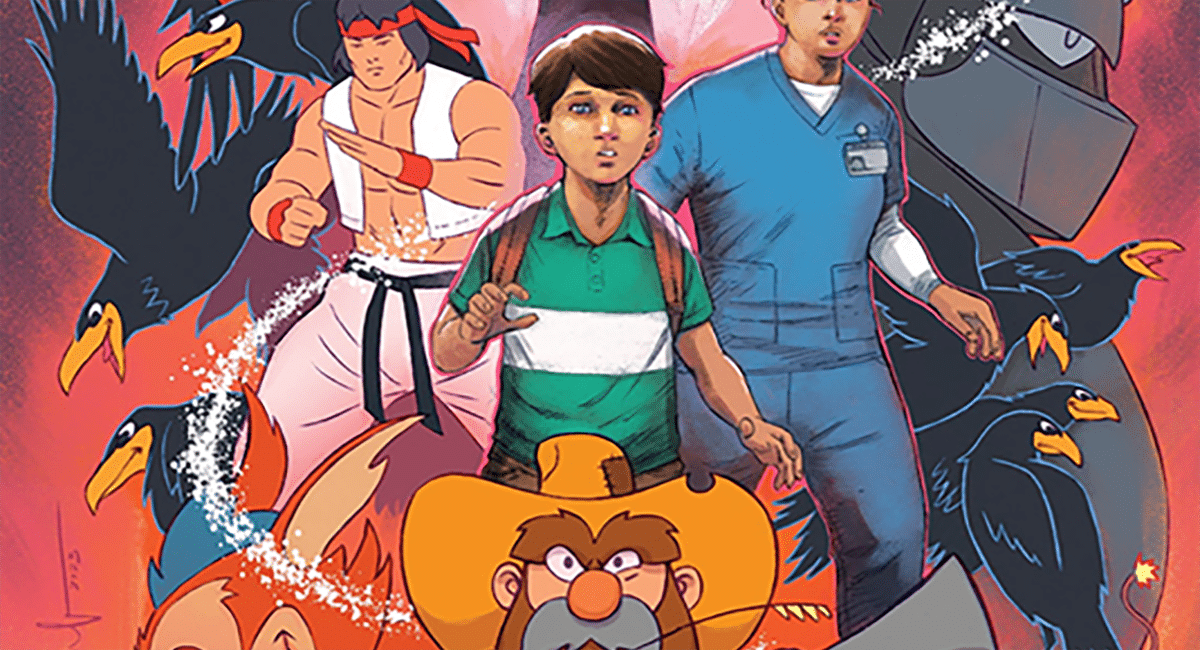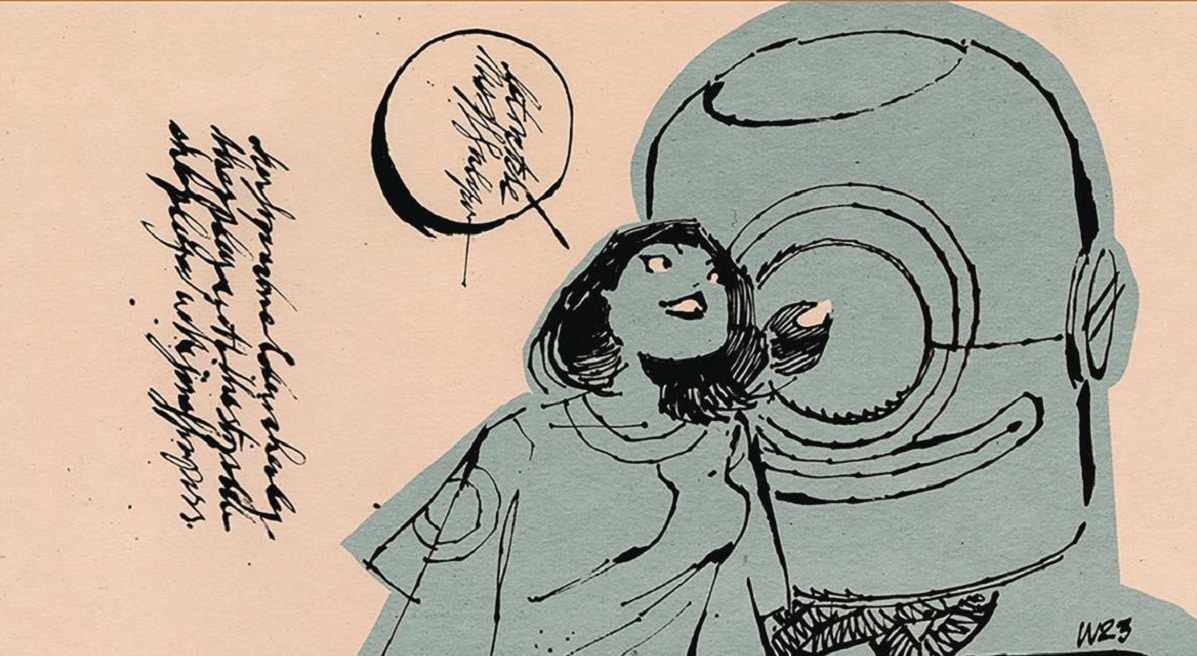 by Alex Dueben
by Alex Dueben
For more than a decade, Gregg Taylor has been the writer, director and one of the voices behind Decoder Ring Theatre. He’s collaborated with other writers including Chris Schweizer with whom he made six all new Crogan Adventures stories, he’s made a mystery series Blackjack Justice, but he’s primarily been telling the superhero adventures of The Red Panda. The character began as one that was clearly influenced by The Spirit and The Shadow, but over the years as he aged, as the Great Depression gave way to World War II, as he fell in love and got married, and as the status quo shifted, The Red Panda became that rare comic/pulp hero that changed and grew more interesting as he and the show did.
The way that Taylor has managed to write a longform superhero serial, incorporate actual historical events, manage to move between street level crimes, mystical adventures and global threats, with colorful villains and an idiosyncratic romance, it’s a wonder that Marvel or DC haven’t asked him to revamp their legacy characters. After 120 Red Panda radio adventures–not to mention 3 novels and a comics series from Monkeybrain Comics with artist and colorist Dean Kotz–Taylor is trying something different with the Decoder Ring Theatre podcast. This fall he and others have adapted the comics into motion comics using the series’ voice cast, which they’re releasing on Saturday mornings through the end of the year. Taylor spoke about The Red Panda, the nostalgic appeal of Saturday morning cartoons and more.
Alex Dueben: For people who don’t know, who is The Red Panda?
Gregg Taylor: The Red Panda is the masked protector of Toronto in the 1930s and 40s. He started life in the full-cast audio series The Red Panda Adventures that I wrote and directed for the Decoder Ring Theatre podcast, and then branched out into a series of adventure novels and the comic book series Dean Kotz and I did for Monkeybrain Comics. He’s really my love-letter to the adventure programs of the great radio era, to the hero pulps, to the serial adventure films, to The Spirit – to any of the many stories where a man fights crime in a nice suit and a domino mask, really.
Dueben: Last year you wrote and directed your 114th Red Panda adventure, The Final Problem and you “finished” the character’s story and I wondered if you could talk a little about why you made that decision.
Taylor: The radio show has always been the “senior service” for the Red Panda’s universe. The books and comics told stories from other points in the continuity, but the main story arc marched relentlessly along for eleven seasons. Time passed and things changed and grew. We were telling a story in the past, but the characters weren’t stuck in amber. In the sister series, the detective show Black Jack Justice, very little time passed and very little changed over the years, but the Red Panda Adventures takes August Fenwick from some of his earliest days as the Red Panda in the early 1930s, right through World War II and beyond. His relationship with his partner, Kit Baxter, grows from mentor/sidekick to a true partnership, to romance to marriage, and it all happens very gradually, in between punches thrown and bad guys thwarted. Kit went from love-struck chauffeur to girl reporter to associate editor of the Daily Chronicle. Secondary characters grow, mature and change, taking on roles you couldn’t have guessed at when they first appeared.
Time gave us the luxury of making a light-hearted adventure program, and also making something that cared about the characters and their journey. The actors would come in to record the show and they’d get very excited and ask things like “Hey, have you thought about what will happen when the war breaks out?” And I’d say… “Well, yes…” and then I’d rattle off crazy plot complications and massive ongoing story arcs that it seemed ridiculous that we’d ever actually get to do… and then we just kept working until we had actually done them!
We took the Red Panda from a brash young man who didn’t really like his alter-ego very much at all, and used his money and his training to protect his city, to a man who had grown, and was willing to step aside, if he could do so without betraying the trust he had taken on. Part of me would have loved to stall, and keep playing, but I felt an obligation to let him find his “ending”, to finish the game we had started. We did another season after the “end”, six episodes that bounced around the character’s history, wrapped up in a framing device of Kit and Gus, moving on to the next phase of their lives, and looking back. We did some terrific episodes like that, but it was harder than I had thought… I was so used to being driven by this massive arc, and I found I missed it. It was like we weren’t doing it for Kit and Gus anymore, they were hanging around waiting for me to be ready to stop. It was time to try something else.
Dueben: So what interested you in making motion comics?
Taylor: You know, we came up with the idea a few years ago with the first three-issue comics arc that Dean and I did, under the title Mask of the Red Panda. We had the voice actors, we knew how to do the sound mix, and my friend Steven Burley, who is part of our voice cast, and the announcer for the radio show, was very excited to take the reins as the video director. In reality, we devised the project as something we could Kickstart, and hoped to go into stretch goals and fund the creation of more comic books, which is exactly what happened… but I just fell in love with the darn things. It was a completely different experience doing the audio mix to accompany set visuals, rather than an audio drama “theatre of the mind” approach, and once they were done I just loved having them. Dean’s art is so kinetic, it really lent itself to the motion that Steven gave it, and it was wonderful to take a step back and give so much control, first to Dean then to Steven. I guess it was inevitable we would want to make an ongoing thing of it if we could.
Dueben: So these motion comics are adaptations of the comics that you and Dean Kotz did at Monkeybrain?
Taylor: Yes. We’re starting with the second comics arc, Night of the Red Panda, which is ten issues long, and they’ll be released both through the Decoder Ring Theatre podcast feed for download, and on YouTube each week. Then we’ll also release the original three issues through the podcast feed, where they never appeared before.
The great thing about digital comics is that they’re never out of print, but after the initial release, there’s not a lot driving people to them, so hopefully this may give them a little bit of new reach.
For me though, the desire to adapt these issues really came from looking at the whole catalogue, four novels, the comics and 120 radio episodes running something like 56 hours. I’ve been pulled in different directions by other work, and I thought, “What if this were it? Could I be satisfied with that?” and the lack of video comic adaptations for these stories was the thing that I just could not abide. So we rolled up our sleeves and fixed that.
Dueben: Now that you wrapped up Red Panda, do you keep thinking of returning to it somehow, reinventing it, trying something completely different?
Taylor: Well, we just released episode 120 a couple of months ago, so it hasn’t been that long, but I can’t imagine a world where I’m totally done writing about the Red Panda and the Flying Squirrel. The Red Panda Adventures, the half-hour radio series, that seems to be done, but there are lots of other things we can do. I was always leaving gaps in the story, untold adventures that were referred to… heck, we pretty much skipped the year 1940. So its certainly possible to do more… I would want it to be something exciting, that the audience and the actors and I could all get jazzed about doing. I’d be astonished if I didn’t do fifth novel, since I’ve been promising The Sinister Simian off and on. If we did more original audio I’d quite like to try a true serial, 10-12 minute episodes a few times a week, like the old Superman or Captain Midnight shows. I’m not quite sure when that would happen, but it might. I love writing comics, and don’t get to do nearly enough of it, so I’d be open to doing more Red Panda comics eventually, though it would be great to work on some other projects first. And of course I continue to daydream about an animated project that would feel like an old Republic film serial, that would be the jewel in the crown. But right now I’m enjoying this project, and getting that out into the world, to see what it thinks.
Dueben: I know you’re doing some writing right now. What else are you working on?
Taylor: I’ve got my hand in a couple of projects now. I was asked to work on a series of interactive books for young readers called Together Tales, and of course did a superhero story called Capes in the Family (shameless plug: https://togethertales.com/capes-in-the-family ) and there are a couple of sequels that are yet to come out, so that’s nice.
The project that is closest to my heart right now is a series about a 12 year old girl named Abagail Branagan who opens a detective agency in her parents garage. It really started when my daughter turned five and began asking if every story or movie or TV show “had a girl in it”, and a lot of times they didn’t. Or there would be one and she would mostly get rescued, which made my daughter furious. So I started writing something for her, and Abagail is what evolved. She’s a lot of what I remember from that age – not wanting to be a little kid any more, or be thought of in that way by adults, but not really having much interest yet in what’s supposed to come next. So to get through a boring summer vacation, she reinvents herself as a detective. If Tom Sawyer can run off to be a pirate, Abagail Branagan can be a detective!
I’ve had some success writing a female detective before, which helps, but mostly it is the relationship to my daughter that keeps it authentic. Tessa hasn’t reached that point in her life yet, but in imagining her in the role, it helps me to keep the character worthy of her, just like writing Kit Baxter or Trixie Dixon for the actresses who played them enriched that characters. So we wind up with this protagonist who is smart and stubborn and flawed and wonderful, and I’m really loving developing her stories and her world. I’m loving the writing, anyway. That part is fun and freeing and gives a tremendous sense of accomplishment. The rest of the process, trying to take this lovely thing you have made to the alter of the publishing industry and getting anyone at all to even glance at it… I am just the worst a that. I know everyone feels that way, but I’m pretty sure in my case it is actually true. I know there’s an unwritten rule that you’re not even supposed to talk about that part of the process, or acknowledge that it is happening until it is over, so you wind up talking to writers who insist that everything is awesome and burying a lot of self-loathing. I wear my self-loathing like a crown of thorns, and I do plenty to earn it. But this project feels worth it to me, so we’ll see if I can manage to do right by Abagail and her stories, and feel as good about that as I do about these new Red Panda adventures!
Dueben: So the motion comics will be appearing once a week through the end of the year? Why did you decide to do it like this, through the podcast, on Saturday mornings?
Taylor: It just felt so natural. I mean, these aren’t really cartoons, not proper cartoons, though I’d love, love, love to do some… but they connect to that eight-year old part of me that used to live for Saturday mornings. It seems strange to be emotionally connected to it, because TV really sucked for kids then, by comparison. It was just not really meant for us. Sure, there were some shows for pre-schoolers through the week, and where I grew up if you were home sick there was a Flintstones re-run on at lunchtime, but other than that, it was for grown-ups. Except for four or five hours on Saturday morning when it was all for us – and in a cruel joke, everyone was showing them at once, so you couldn’t possibly watch them all! I used to hate things like Wimbledon and the Olympics so much because they would mess with that day. That was my day, you tennis-playing jerks! These days there are networks that show cartoons morning, noon and night, and they stream on demand, and that’s good. Change is good. But with moving to a weekly release, it had to be Saturday. I wanted people who are my age to remember that feeling of waking up on Saturday mornings and knowing there were adventure stories waiting that are just for them!


